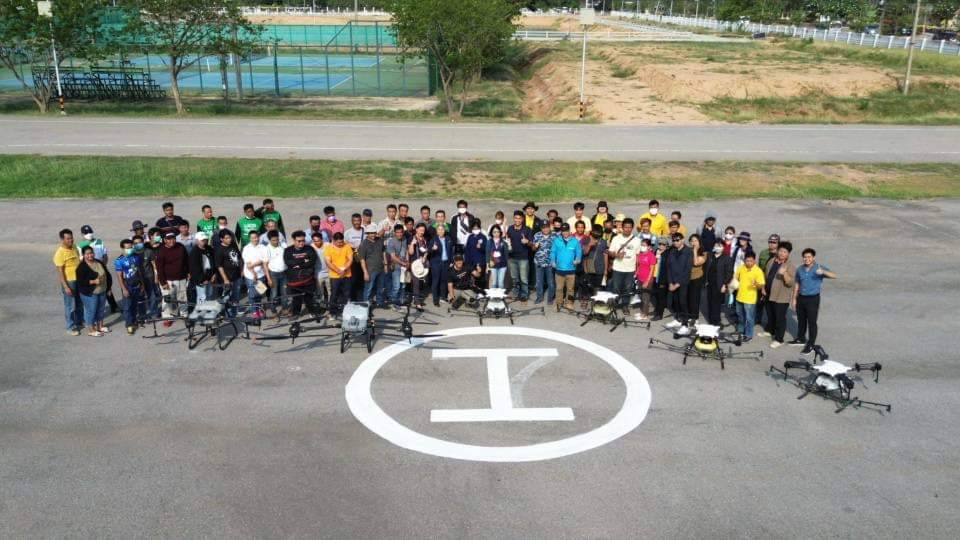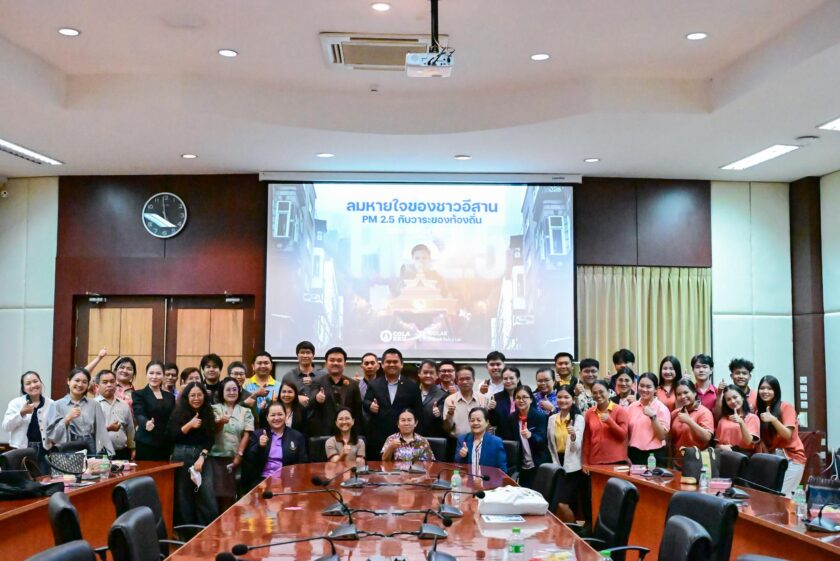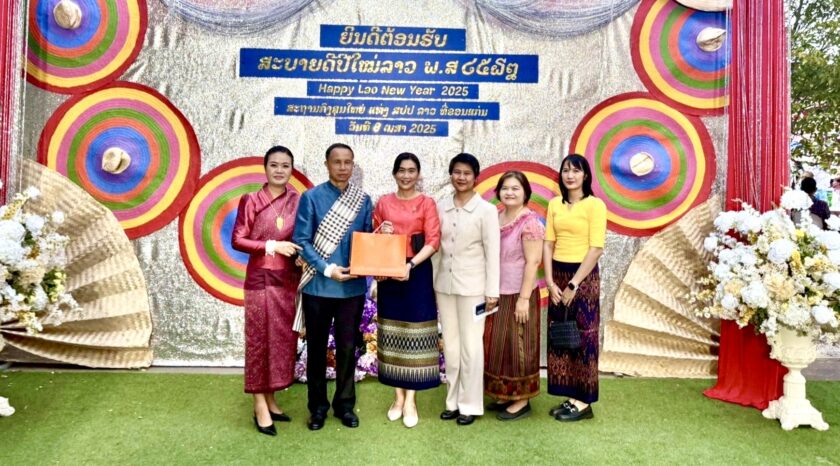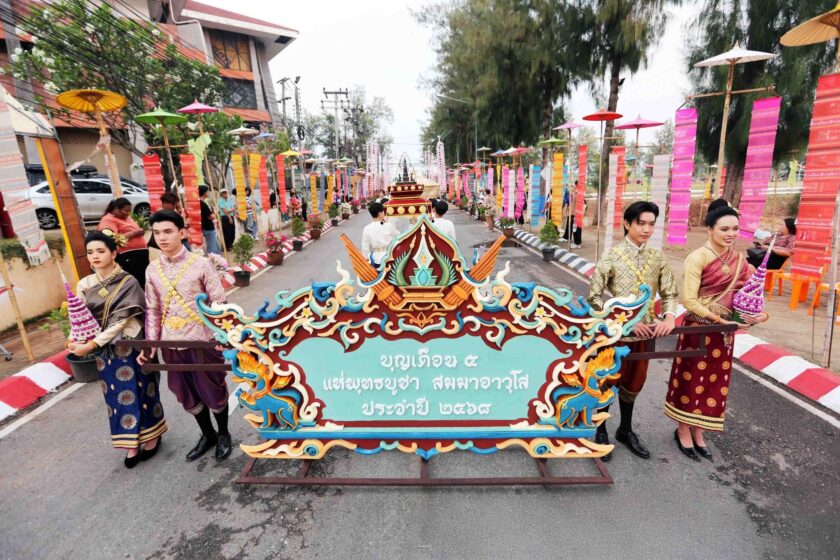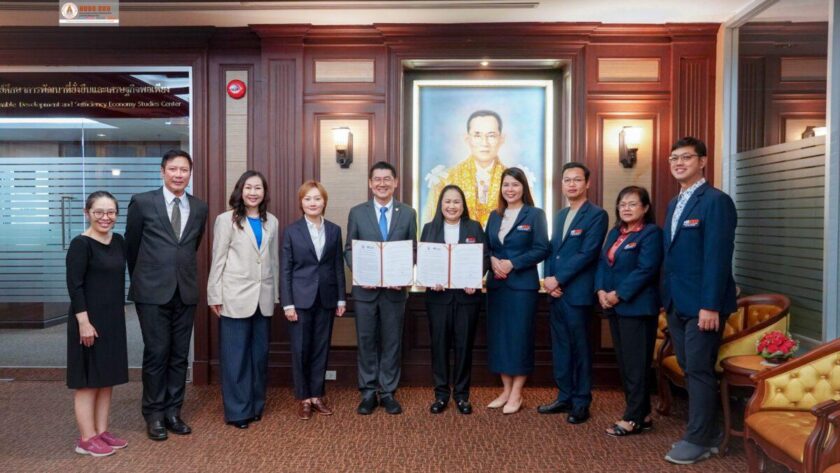KKU is molding “agricultural drone pilots”, a new trending occupation that can bring incomes to new-generation farmers in communities by transferring techniques and knowledge in the control of agricultural drones and various agricultural techniques to farmers, getting them ready to plan business models for sustainable occupations.
Labor-saving agriculture by the use of animals has turned to a historical image, while machines such as tillers and sowing trucks have become trendy tools in the present farming and are used in parallel with human labor. However, farmers still face some limitations of human labor that requires a lot of time and costs. At the same time, tillers can get stuck in mudholes during the rainy season or they are not able to enter the area when farm produce grows bigger.
“These problems will be solved with new technologies such as agricultural drones that help reducing costs and time. A drone works efficiently and rapidly by spraying over 3 rais of land in only 10 minutes. Moreover, it can spray chemicals and sow seeds in all areas. In the future, drones are going to be a new trend in agriculture, just like the walking tiller that replaced animals and the driven tiller that replaced the walking tiller.”

Assoc. Prof. Khwantree Saengprachatanarak, Ph.D., a lecturer of the Agricultural Engineering, Faculty of Engineering, Khon Kaen University, explained about the rationale of the Agricultural Drone Pilot Occupation Development Project that the Department of Agricultural Engineering has continuously conducted a study and developed the innovations for agriculture, especially the innovation involving agricultural drones for plant protection, assessment of conditions and productivity of plants by the use of drones. The knowledge in this regard has been developed since 2016 until now. The knowledge was extended in the training with an aim to develop community areas and develop farmers to become Smart Farmers.
Agricultural drone left unused because there is no pilot.
The Agricultural Drone Pilot Occupation Development Project began from researchers entering the area to perform surveys on farmers in Chaiyaphum and found that the farmers were facing the problem of shortage of labor. At the same time, the attempt to use technologies to facilitate farmers such as the use of agricultural drones is not successful. Farmers working with big plantation fields were found to own drones, but 70% of which were left unused, for there was no skillful pilot. The Faculty of Engineering by the Department of Agricultural Engineering and Department of Computer Engineering thus joined with the Department of Agricultural Economics, Department of Agronomy, Faculty of Agriculture; and Department of Sociology, Faculty of Humanities and Social Sciences to conduct the
project after seeing the importance of it.
“The aged society results in shortage of agricultural labor, while a lot of new-generation laborers returned to their hometown after Covid. Khon Kaen University therefore wanted to build a new occupation, the agricultural drone pilots, by training the community new-generation farmers to become “Young Smart Farmers.”
Transfer of knowledge of business models

Assoc. Prof. Khwantree added that the Agricultural Drone Pilot Occupation Development Project surveyed the context of the area and used the results as the topics of the training on the control of drones, drone maintenance, and effective management of the use of batteries, which would make the use of drones worthwhile. The training included topics on the advantages and limitations of each version and size of drones, the selection method for specific use, the selection of appropriate nozzles for spraying, the sizes of droplets, cross-section widths, speeds, and flying heights that are appropriate for each situation, including solution of problems that occur during strong winds.
The training also provided knowledge about the use of spray agents in order to assist decomposition of sugar cane leaves, rice stubbles, and crop remains for reduction of burning and at the same time helps in fertilizing the soil. There were also topics on the accurate selection of chemicals that control weeds by giving example of chemical sets and the right method of mixing for good activation when used on drones as well as the selection of chemicals that are suitable to the type and moisture of soils. A professional drone pilot was the trainer at the workshop for 3 days last May.

“The trainees had a chance to practice controlling the drone. Those who can drive the drone already asked the expert for solutions of different problems. There was a session where the trainer and trainees exchanged knowledge and experiences together, from the technique in preparing the chemicals, drone flying technique, nozzle changing, and maintenance and cleaning of drones.”
A new trending occupation that will bring sustainable income
It was not only training of piloting agricultural drones, but the Project also built a network for coordination from the financial institution, the governmental sector and the private sector in the area, from which a business model for hiring spraying drones has been created in 3 forms. The 70 trainees have understood the sole-investment model, SME hiring model, how to invest on drones, cars and tools or the model of hiring and dividing percentages with the pilot, and the model of drone purchase by big-plantation farmers before the member who is a pilot rents the drone for his job.
“The occupation of agricultural drone pilot in Isan is still a new occupation in which there are a lot of market gaps. The survey showed that this agricultural drone pilot occupation can create 20,000 – 50,000 baht of incomes. In the future, it can be the occupation that makes sustainable income for farmers in the community.”

Although the training under the Agricultural Drone Pilot Occupation Development Project ended, the related knowledge and technologies are not going to stop. The Department of Computer Engineering and the Department of Agricultural Engineering of the Faculty of Engineering, Khon Kaen University have created the online platform called, “Drone Learning Space”, as an area for exchanging of experiences and for information seeking or learning of techniques of agricultural drones. The online drone learning space can be reached at all time and from anywhere, enabling people to train to be a professional agricultural drone pilot.
News: Phanit Khatanak

